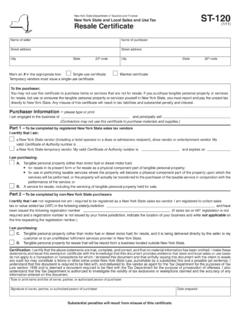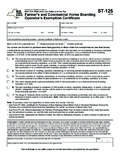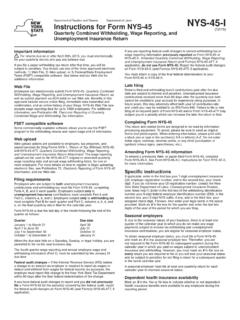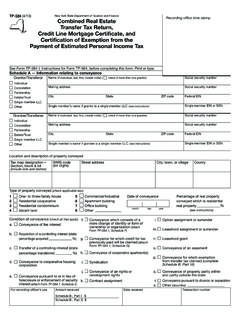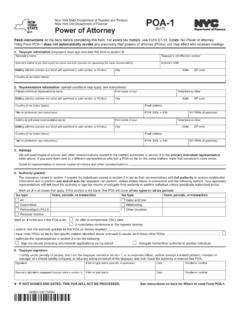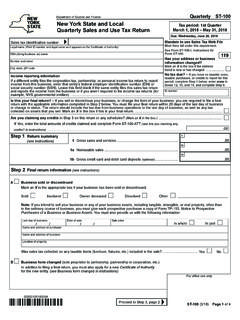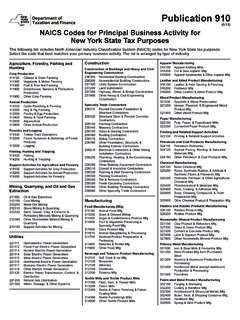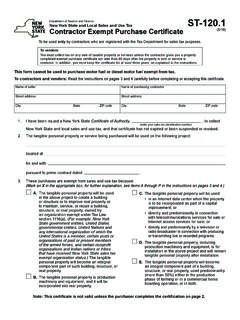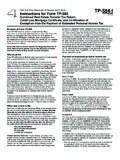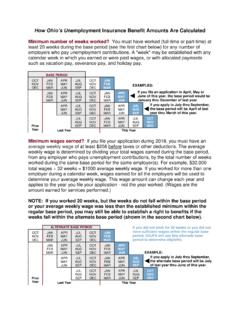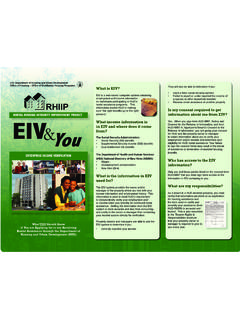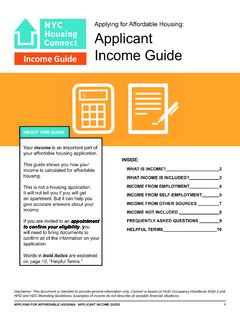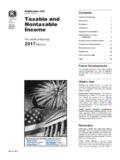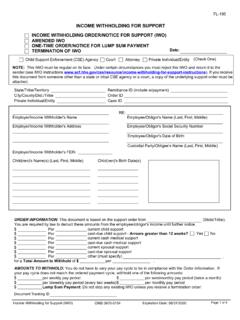Transcription of Form RP-459-c-Ins:8/11:General Information and ...
1 RP-459-c-Ins (8/11) NEW YORK STATE DEPARTMENT OF TAXATION & FINANCE OFFICE OF REAL PROPERTY TAX SERVICES GENERAL Information AND INSTRUCTIONS ABOUT THE PARTIAL PROPERTY TAX EXEMPTION FOR PERSONS WITH DISABILITIES AND LIMITED INCOMES The Law Section 459-c of the Real Property Tax Law gives local governments and public school districts the option of granting a reduction in the amount of property taxes paid by qualifying persons with disabilities. To qualify, persons with disabilities generally must have certain documented evidence of their disability and meet certain income limitations and other requirements.
2 For the basic 50 percent exemption, the law allows each county, city, town, village or school district to set the maximum income limit at any figure between $3,000 and $29,000. Localities have the further option of giving exemptions of less than 50 percent to persons with disabilities whose incomes are more than $29,000. Under the sliding scale options, a qualifying owner can have a yearly income as high as $37, and get a 5 percent exemption in places where they are using the maximum limit. Please check with your local assessor or the clerks of the local governments and school districts involved to determine which local options, if any, are in effect.
3 Note that property may not receive an exemption both under this law and the senior citizens exemption (Real Property Tax, sec. 467) for the same municipal tax purpose. However, where one or more owners qualifies for exemption under this section, and the other owner qualified for exemption under section 467, the owners may choose the more beneficial exemption. Where to File the Application The application form (RP-459-c), should be filed with the city, town or village assessor for partial exemption from city, town and village property taxes. For partial exemption from county or school district taxes or from village taxes in villages that do not assess property, file the form with the town assessor who prepares the assessment roll used for county, school, or village taxes.
4 However, in Nassau County, applications for exemption from county, town or school taxes should be filed with the Nassau County Department of Assessment. In Tompkins County, applications for exemption from county, city, town, village or school district taxes should be filed with the Tompkins County Division of Assessment. Deadline for filing The application generally must be filed in the assessor s office on or before the appropriate taxable status date, which, in most towns, is March 1. In Nassau County, taxable status date is January 2.
5 Westchester County towns have either a May 1 or June 1 taxable status date; contact the assessor. In cities, such date is determined from charter provisions. In New York City, taxable status date is January 5, but applications for this exemption may be filed on or before March 15. Taxable status date for most villages that assess is January 1, but the village clerk should be consulted for variations. Renewal Application An annual renewal application must be timely filed in the assessor s office to continue the exemption.
6 The RP-459-c or the RP-459-c-Rnw may be used for renewal purposes. The following numbers correspond to the numbers on the initial application form. 1,2. If the title to the property is in more than one name, each of the names must be set forth. The deed, mortgage or other proof of title should be examined to ascertain the name of the owner or owners. If the property is owned by more than one person, all owners must qualify for the exemption. That is all of the owners must be persons with disabilities, except if property is owned by a married couple or by siblings, only one needs to have a disability.
7 Note that if a person holds a life estate in the property, that person is the legal owner of the property. If the property is held in trust, the exemption may be allowed if the beneficiary of the trust qualifies. Answer all questions on the basis of RP-459-c-Ins (9/09) 2 the beneficiary s qualifications for the exemption. Attach a copy of the trust or other proof of such trustee-beneficiary relationship. Municipalities which offer the exemption for persons with disabilities and limited incomes may also offer it to otherwise qualifying individuals who are tenant-stockholders of a cooperative apartment corporation.
8 The percentage of the exemption to which the individual is entitled will be applied to the percentage of the total assessed value of the entire parcel that represents the tenant-shareholder s percentage of ownership of the stock of the corporation. 3. Location of the property should conform to its description on the latest assessment roll. Contact your assessor for assistance in furnishing this description. 4. To be eligible, an applicant must currently have a physical or mental impairment, not due to current use of alcohol or illegal drug use, which substantially limits that person s ability to engage in one or more major life activities, such as caring for one s self, performing manual tasks, walking, seeing, hearing, speaking, breathing, learning or working.
9 Briefly describe the applicant s impairment. 5. To be eligible, the applicant must submit either (i) an award letter from the Social security Administration certifying the applicant s eligibility to receive social security disability insurance (SSDI) or supplemental security income (SSI), (ii) an award letter from the Railroad Retirement Board certifying the applicant s eligibility to receive railroad retirement disability benefits, (iii) a certificate from the State Commission for the Blind and Visually Handicapped stating that the applicant is legally blind, (iv) an award letter from the United States Postal Service certifying a disability pension, or (v) an award letter from the United States Department of Veterans Affairs certifying eligibility for a veterans affairs disability pension.
10 In answering question 5, check off which documentary evidence is attached to the application. If the letter or certificate indicates that the applicant s disability is permanent, there will be no need to refile evidence of disability in future years if renewal of the exemption is sought. 6. The applicant must provide proof of ownership of the particular property upon which the exemption is sought. Such proof might consist of a copy of the deed by which title was acquired by the applicant or a copy of a mortgage agreement or other document indicating that title is vested in the applicant.
